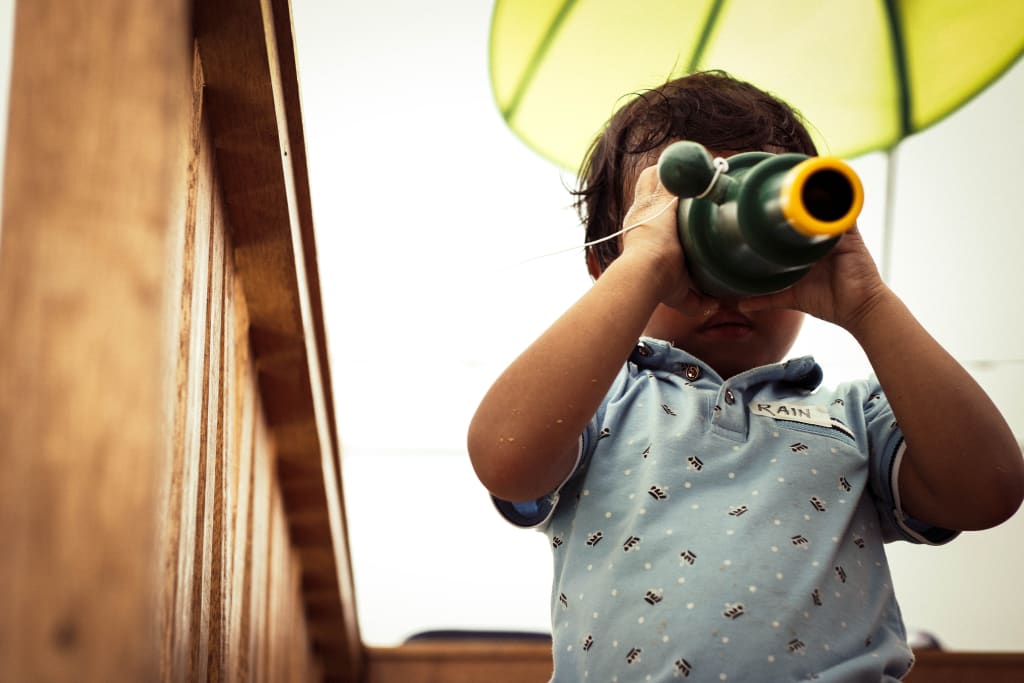Curiosity - An Ethical Endeavor
Putting Curiosity at the Core of Education

We've heard how curiosity killed the cat, but before this feline blunder, we never got the chance to see how it used curiosity to learn, develop, and survive. Numerous mid and late 20th century psychologists made it a focal point. The dedication of this research has shown the many benefits, uses, and sources of this tool. Sir Ken Robinson, a great mind of education, has spoken on how curiosity is vital for students, and their ability to grow. He has said that we can even consider it an ethical endeavor that must be integrated into our educational system.
When we think about it—we realize something. Curiosity is at the root of our most significant advances in society and science.
Why does this apple fall?
Why do we treat these humans with such cruelty?
More important than any inquisition that begins with why is one that starts with 'what.'
So, what does curiosity mean for the future of our school systems?
It means that everything we have developed thus far should come into question. As people, teachers, and student's progress, the system of public education, on the other hand, has been stuck in the19th century. It has done little to transform since then. As we travel back to when schools became a tool for the masses, we notice it was in an era of strict needs—the age of industrialization. It was straight forward in fashion—'we need this specific information to help us power our country into a new era.'
Fast forward to the 21st century, and this has caused more restriction than an opportunity. It has become too familiar that the classroom dissatisfies students. As we place an undue priority on assessments, vital lessons fall to the wayside. Here, we find the first ethical dilemma-the call for the need for curiosity. And so, let's not make the boring classroom the standard anymore, as we bring curiosity and an age of exciting education.
"Lectures should go from being like the family singing around the piano to high-quality concerts." ~ Bill Gates
Ethical Curiosity: Freeing the Mind with Critical Thinking(1)
Look at animals in cages. What is the ethicality of trapping a living being in a restricted space? Being stuck in confined spaces must have adverse effects. What if we were to transfer this concept to the jails of our minds?
Since our educational systems stifle curiosity, it's not uncommon to find a headline saying this is true. Our current education system is taking away one of the few things that can keep us free from the confines of our minds and environment; critical thinking and the ability to problem-solve.
Going beyond the classroom and following students into their daily lives, employing a healthy dose of curiosity will help them solve their problems on more than just an academic level, but a personal level too. In instances when parents and teachers may not be able to help, it will help our youth to find the solutions that plague them. It is this ability to solve emotional, physical, and other complicated burdens that make curiosity more than just a tool to help students learn.
To encourage curiosity is to free the mind from the fearful cages that surround us. It allows us to dig deeper and climb the latter to self-realization. Digging deeper is where we discover the key to personal growth. Not only that, but it can lead to world-changing inventions and innovations.
Wonder and the Search for Answers(1)
The limits of our understanding are related to the extent of our empathy in everyday life. For beyond our understanding lies a complicated and barren world; here, others are too different. With curiosity at the helm, we are more likely to take stride into finding a fresh way to understand those around us. This ability to step closer to those we fear helps us realize that we are all humans in this world, fighting the same battles. As it replaces fear-driven motivation, curiosity can help us conquer the barriers we consider impossible. It can bring us one step closer as a community.
Too often, we close ourselves to what other people believe because we have quenched our curiosity for that subject. However, as imperfect beings, we will never have all the answers in this limitless universe. It is this wonder and ability to look for the hidden commonalities that will help strengthen our societies and as a civilization.
So, for a more peaceful mind, we must cultivate curiosity.
We spend much of our childhood in school, and this environment shapes us into the adults we become. We must see our schools as more than just the transfer of information in math and science. Education has a vast list of potentials and should be seen as an educational organization with compounding possibilities.
Discovering Virtues and the Chance to Live a Full Life(1)
We find ourselves, and our purpose is at the core of the journey of personal development. However, the limited breadth of primary and secondary schools only provides us with a part of our opportunities in the actual world. If we give students more exploratory rights, they will gravitate towards their most exceptional talents.
Meaning in our life gives us motivation, direction, and happiness. We will continue to this in our other topic lines, such as 'Diversity' and 'Collaboration'. It's integrations such as these that can push the envelope in how we see our students in a dynamic light. What makes for exceptional leaders and team players must have a model in the most critical years of childhood development.
When we do this, and diversity becomes the new normal, we will see each other just as that—normal. Let us encourage these differences through the many facets of life that will help students achieve success and push society into a new era.
Final Thoughts:
Curiosity has been at the forefront of many revolutionary changes. As a curious species, it has pushed us into our earliest life lessons, from walking to talking. Many benefits come with being curious, and breaking the generational curses that keep us separated is one of them.
A source of conflict comes from assuming we have all the needed knowledge as we close ourselves to unique perspectives. What we forget is that everyone has something to teach us. It is when we replace our pride with curiosity that the fences we hold will fall. So, let's build a center for understanding—let us put curiosity at the seat of our ego as we transform the world through education!
Check out my original post at my website!
Community Engagement Question:
I'm sure to have missed aspects of why curiosity should be our next ethical endeavor. In what ways have you seen it shape someone for the better? Drop your thoughts and discussions in the comments below!
Special Thanks To:
Cover Photo by Joseph Rosales on Unsplash
(1) Soern Finn Menning (2019) Why nurturing curiosity is an ethical endeavor: exploring practitioners' reflections on the importance of curiosity, International Journal of Early Years Education, 27:1, 34-51, DOI: 10.1080/09669760.2018.1547632
About the Creator
Keane Neal-Riquier
Writing and storytelling have been a passion of mine ever since I was young. I look to dig deep into what it means to be human, and this is what you will find at the very core of my writing.
Website: atyourservicefreelancing.com
Enjoyed the story? Support the Creator.
Subscribe for free to receive all their stories in your feed. You could also pledge your support or give them a one-off tip, letting them know you appreciate their work.






Comments
There are no comments for this story
Be the first to respond and start the conversation.